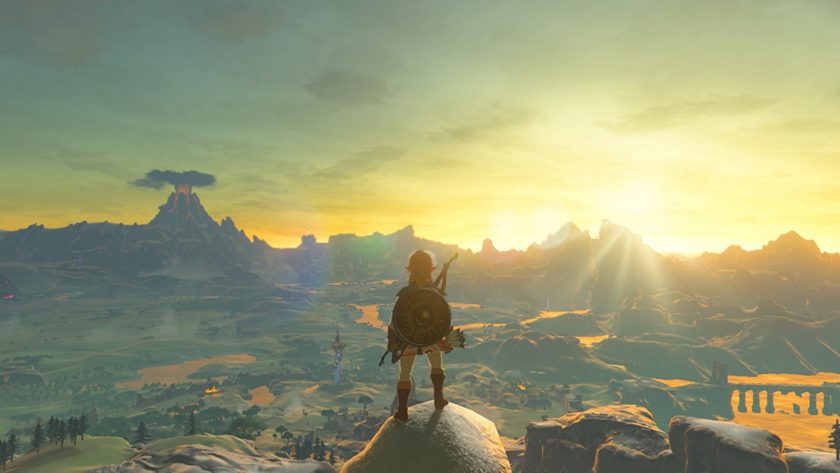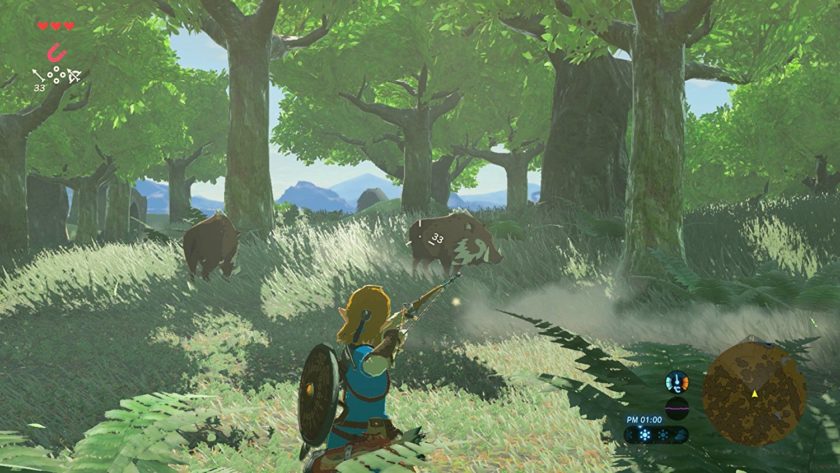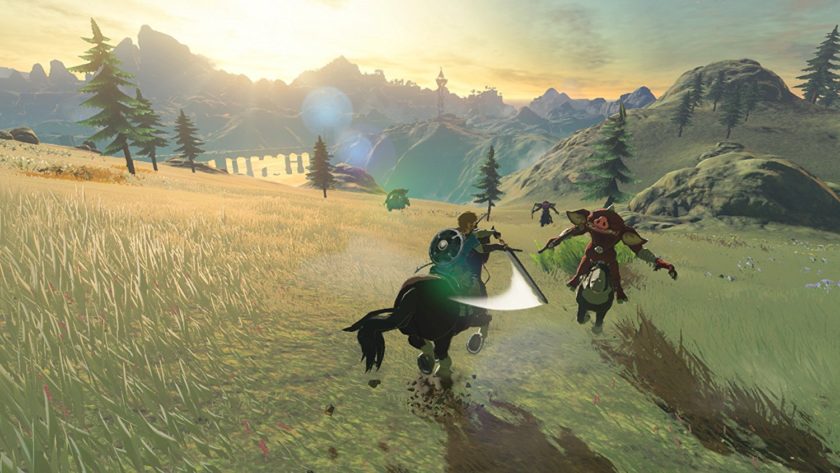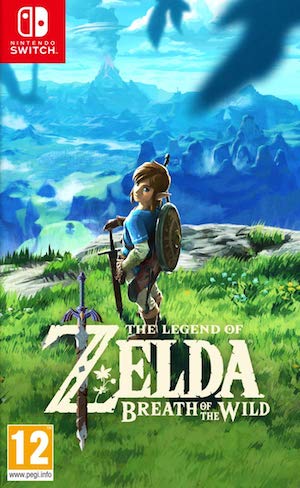
You don’t need me to tell you that The Legend of Zelda: Breath of the Wild is ridiculously hyped. Ever since its unveil at E3 last year, the game has won every major anticipatory award that there is, and is arguably the most hyped game of this year, if not of the entire generation so far. The reason for the hype is evident- Breath of the Wild looks to be the kind of modernization, and the evolution of the series’ original vision hinted at in the older games, but never quite realized, that the Zelda franchise desperately needed.
A full open world Zelda game, with full modern gameplay mechanics, reams of content, an emphasis on storytelling and presentation with voice acting, and cues taken from other games of the era, including Dark Souls, Skyrim, and Far Cry? A game that pushes the envelope of exploration in video games further than any other game has so far, much like the original Zelda or Ocarina of Time did? There’s a reason that Zelda is as hyped as it is right now- but with that much hype comes the crushing weight of actually having to live up to expectations.
As a player, actually getting to play Breath of the Wild is a bit of a surreal experience. This is the kind of game that most Zelda players have dreamed of ever since Ocarina of Time, the kind of game that we expected ten years ago but never got, the kind of game that Zelda fans had given up on ever getting. This is a game that we have had the chance to see an awful lot of (albeit in controlled doses)- there is so much hype and hysteria around this game that it comes with its own legend already attached to it.
So when I finally got to play The Legend of Zelda: Breath of the Wild at Nintendo’s Switch and Play event in Toronto last week, I approached it with some trepidation and apprehension mingling with my hype and anticipation. Really, my only reason for even attending this event was to get my hands on Zelda– and now that I was getting the chance to go hands on with the game, I was afraid of being let down. Particularly since it has been a very long time since a console Zelda game impressed me upon release.
"Breath of the Wild is every bit as great as the hype, and your own expectations, make it out to be. From the minute you equip Link in the first bit of gear that you get your hands on, and step out into the massive, unbounded world of Hyrule, the game sinks its claws into you and refuses to let go."
My fears were unfounded- Breath of the Wild is every bit as great as the hype, and your own expectations, make it out to be. From the minute you equip Link in the first bit of gear that you get your hands on, and step out into the massive, unbounded world of Hyrule, the game sinks its claws into you and refuses to let go. As soon as you step out on to the Great Plateau (the game’s introductory area, which is single handedly bigger than the map of any Zelda game previously), you are let loose into the world, with no protracted cutscenes, introductions, or tutorials. The game just drops you into Hyrule, and lets you do what you want, trusting your instinct, and explaining things as you go along. Most of Breath of the Wild‘s tutorializing is implicit and embedded into the fiber of the game itself.
You notice a short outcrop of rock above you, and what appear to be mushrooms growing on it, so you run towards the face of the cliff and discover you can climb up its surface, for as long as your stamina meter doesn’t give out. You climb up and you pick up the mushroom, and you realize it is an ingredient for a meal that you can apparently cook. You start going down, when you notice an apple hanging on a tree. You climb up the tree to get the apple, when you notice that one of the branches of the tree has fallen. You go down and pick it up, and realize you can use it as a weapon. You equip it to use it as a weapon, when you see an old man by a fire in the distance.
You go and talk to him, and he cryptically doesn’t say much, but points at where you should be going, but don’t have to. If you listen to him, and start making towards that direction, you will eventually run into enemies- you whack the enemies with your stick, and pick up their weapons, and continue on. if you don’t, then the entire world is still your oyster- you see a ruined building in the distance. You can make for that. You can turn around and go in the exact opposite direction of where you should be going. You can try and make your own way in the wilderness. You will have to fend for yourself, but the game won’t stop you- you do exactly what you want to do.
This kind of freedom and open ended exploration is joyous and wonderful- indeed, it is in keeping with the spirit of exploration and wonder of discovery that first motivated series creator Shigeru Miyamoto to make The Legend of Zelda on the NES in the first place. More than any other game ever released, more than even Skyrim, since even Skyrim forces you to sit through an introductory sequence before it lets you loose in its world, Zelda has the confidence in itself, and the world that it has built, to not force the player to do anything. It knows that the world it builds is compelling enough that no matter what players do, they will be satisfied and engaged. And it knows that eventually, players will make their way towards the beacon on their map that they are supposed to be making for, anyway.
"Zelda has the confidence in itself, and the world that it has built, to not force the player to do anything. It knows that the world it builds is compelling enough that no matter what players do, they will be satisfied and engaged."
It helps that Zelda controls wonderfully- so wonderfully that the controls become invisible, and fade into the background, and you are fully immersed in the game’s world. Without the needless motion controls that plagued Skyward Sword or Twilight Princess, Breath of the Wild‘s controls are sharp, direct, and never get in the player’s way.
This is most evident in combat, which is extremely satisfying, and thanks to the new system of gear and degradable weapons in the game (where your gear can be outmatched by the attacking power of the weapon being used to attack you – similar to an RPG – and most weapons break or degrade eventually), you are always on edge. Combat itself isn’t difficult- but the prospect of suddenly finding yourself swarmed by enemies and having nothing to fend them off with remains a real one. Add to that the fact that you no longer find hearts to heal (instead, you must cook meals or have potions to recover health), and combat becomes a tense affair, even if it is not difficult.
Happily, most enemies drop weapons aplenty, and that is never actually much of a consideration. Playing Breath of the Wild just a little bit also leads to the realization that the game extends its freedom and open endedness to how the player approaches combat, too- you don’t have to engage enemies in one on one combat. You can choose to sneak around an encounter entirely, or you can utilize the environment to help you in any number of ways. For instance, I took out an outpost of enemies by staying at a distance, and picking them off with my bow and arrows one by one, before I just hit a flammable barrel that was in the outpost and took them all out in one glorious explosion. Another time, I rolled a heavy rock down on to an outpost of enemies right below an outcropping of rock that I stood on, and took them out without needing to use a single weapon.
This open endedness that characterizes the game actually owes itself most to the game’s extensive physics system- all of Breath of the Wild is governed by a full fledged physics system that determines all interactions in the game. You could be holding a lit torch in the air, and the wind could blow the flame into the grass, setting the grass on fire, as one example. You could have been battling an enemy on a slope, and when you finally take them out, their loot slides down the cliff and, say, into the abyss below, simply because that’s how things happen in real life too.
The implementation of a full fledged physics system in Breath of the Wild means that you can interact with literally every single thing in the game with no restrictions– and what happens is determined entirely by the physics of the objects involved. This, coupled with the sheer open ended, exploratory nature of the game, means that Breath of the Wild lends itself to a kind of emergent gameplay that no other title on the market comes close to matching.
"Breath of the Wild looks great, too- while it is very obviously a Wii U game, and that shows in its roots, it’s still a pretty game, if for no other reason than its art, which is strikingly eye catching."
Breath of the Wild looks great, too- while it is very obviously a Wii U game, and that shows in its roots, it’s still a pretty game, if for no other reason than its art, which is strikingly eye catching. More eagle eyed players will notice a fair few technical deficiencies or shortcuts this game employs- but the end result is that Breath of the Wild is a decidedly pretty, good looking game, depicting a lush Hyrule that begs to be explored.
Thankfully, there isn’t much time left before players around the world will get to do just that- The Legend of Zelda: Breath of the Wild will launch worldwide on March 3, and players finally will get the chance to go hands on with what looks to be an early contender for Game of the Year – if not Game of the Generation – then. Highly ambitious and incredibly fun, Breath of the Wild looks to make good on the series’ latent promise, and deliver, at last, the Zelda game that most of us have been pining for for a very long time now.


















